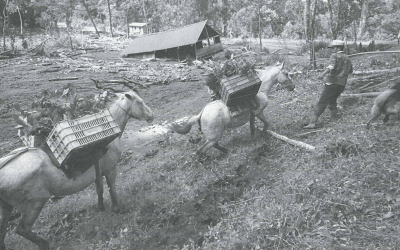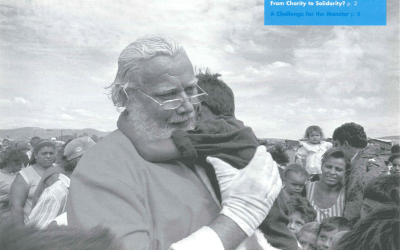Philanthropy In Mexico
Philanthropy. It is defined in the New Expanded Webster’s Dictionary as the love of man or of mankind; benevolence towards the whole human family. And a philanthropist is one who exerts himself in doing good to his fellow men.
In today’s Mexico, these are basic concepts upon which to build a discussion about philanthropy. Historically, as in other countries, many people considered philanthropy exclusively in economic terms, for example, donating money to traditional worthy, charitable institutions such as hospitals, orphanages, museums and schools. The image of the philanthropist was the retired, balding and bespectacled man who, having made a fortune, was now willing to dedicate a portion of it to the benefit of others.
Fourteen years ago, the Centro Mexicano para la Filantropía (Mexican Center for Philanthropy or CEMEFI) was founded. Its mission is to promote a philanthropic culture in Mexico, and to strengthen the organized participation of society in its integral development and in the solution of community problems. Its programs now address issues such as the legal framework for the nonprofit sector, the strengthening of relationships between the nonprofit sector and government agencies, training and capacity building, communication, corporate social responsibility and research.
More than ten years ago, CEMEFI set out to promote a broader and more inclusive vision of philanthropy, one that moved beyond the traditional role of charity. CEMEFI, which has developed expertise on nonprofit issues in Mexico, understands philanthropy as:
– The expression of the generous impulse that surges from every human being, throughout time and in all cultures;
– All acts of respect, attention and service directed towards the development of the human being and to protect his/her surroundings;
– The generous commitment of people, institutions and companies that give time, talent and resources to benefit the integral development of the community;
– Collective, unpaid actions oriented toward social development that leverage talent and human capacity;
– An efficient vehicle to stimulate voluntary participation, distribute resources and create work promoting a balanced and harmonic development of society; and
– All generous and voluntary action realized in benefit of the community without profit or individual interest.
In summary, philanthropy is any private, voluntary, nonprofit work performed for the public good. This definition goes beyond the traditional aspects and seeks to promote organized participation–voluntary citizen participation.
To understand the current culture of philanthropy in Mexico, it is helpful to have a historical perspective. Three distinct periods in Mexican history influenced the development of civil society, beginning with the conquest of Mexico by Spain.
The period from 1521 to 1860 was characterized by a strong presence of the Catholic Church in the creation of charitable organizations. The Church became the majority landowner in the country and generated income to finance schools, hospitals and social programs in the areas of poverty, health and education of indigenous people.
The second period (1861-1960) was marked by a strong presence of the State. In 1861, a liberal government nationalized the holdings of the Church, and acquired with it the responsibility of providing social programs. After the Mexican Revolution (1910-1920) the power of the State was consolidated. Policies focused on the needs of the poor and were implemented through large government agencies responsible for education, health, welfare, and housing.
The dominance of these institutions resulted in a weak civil society and a paternalistic culture that produced dependency and little citizen participation.
The third period represents the past forty years of Mexico’s history and is characterized by greater citizen participation to resolve social problems. Organizations of all shapes and forms have emerged to address many different issues including community development, human rights, environment, civic education and the struggle for democracy. This growth and development of the number of Civil society organizations (CSOs) is explained in part by the increasing social problems, along with the growing civic awareness of a better and more informed public.
In Mexico, where 23% of the population lives in what is considered extreme poverty; where the average income of a poor home is approximately U.S.$70 monthly, half of which is spent on food; where one in three children suffer from malnutrition for a total of seven million children; and where there are 201,000 registered towns of which 92% have fewer than 500 inhabitants and yet represent 12% of the Mexican population…. in this Mexico, it is encouraging to see the growing volunteer commitment of citizens toward their communities.
CSOs have played an important and growing role in Mexico’s move toward democracy. No longer is the sector’s profile that of traditional service-providing institutions. Election reform and civic participation are new areas that have produced dynamic alliances of citizen groups with a voice that is being heard and respected.
At a time when government agencies are faced with significant budget cutbacks, CSOs are being looked to for their creativity, talent and new perspectives to address social ills. Citizens are building a new social force that, if well directed, can become a catalyst for the processes of social modernization.
Civil society today can be understood as those organizations, institutions and individuals that are not part of the government. CEMEFI has defined two important groups within civil society: the for-profit sector, composed of companies that produce goods and services, and the nonprofit sector that has also been called the voluntary sector or third sector. The nonprofit sector has four key pillars: religious institutions, mutual associations, political parties and organizations providing services to third parties. More than 20,000 CSOs in Mexico appear to fall into this last category of nonprofit service providers, although a large number of them are not legally registered with the appropriate government entities.
Although progress has been made towards a more open and active philanthropic and civil society sector in Mexico, there are still many challenges. Among others, the Mexican Center for Philanthropy has identified the following issues:
Legal Framework
Current legislation for civil society organizations is disperse and discretional. It does not promote citizen action, and it does not even provide tax deductible status for more than half of current civil society organizations, especially those working in community development, the environment, human rights and civic education. CEMEFI and a group of nonprofit organizations have worked for more than six years to actively promote a more favorable legal framework for the nonprofit sector. It will continue to do so until new legislation is passed.
Resource Mobilization
As in many other countries, civil society organizations in Mexico suffer from a chronic lack of economic resources. The primary cause is the lack of a philanthropic culture. The paternalistic culture has impeded the development of a social consciousness. Many citizens expect and wait for the government to take action and provide funding.
Professionalization/Training
In general, low levels of staff professionalization have been found in civil society organizations. A vicious cycle between scarce resources and a lack of training makes it difficult for these institutions to offer services in an efficient and effective manner. Specific difficulties and needs have been detected in the areas of planning and evaluating projects, administration of resources, fundraising, accounting procedures and the training of professional staff and volunteers. Advances in information technology and the ability to communication with donors and the community are also issues that challenge the sector.
Visibility
Until recently, civil society organizations have limited their communication primarily to their donors. There was never really a compelling reason to disseminate their activities to society at large.
This has changed in recent years for a variety of reasons. As civil society organizations take a more active role in public debate and as technology facilitates access to information, society has become more demanding about CSO transparency and accountability. Donors are becoming more informed and exigent, since they have more choices as to where they invest their contributions.
Volunteerism
One of the most unrecognized and undervalued resources in Mexico is time and talent committed by thousands of people on a volunteer basis. In times of crisis, such as a natural disaster, Mexican citizens readily contribute to relief efforts as volunteers. None the less, when it comes to a more institutionalized form of volunteering, there is much less awareness and participation.
Again the influence of the paternalistic system is reflected in the attitudes of many citizens. CEMEFI has a registry of persons who have offered volunteer time. However, in many cases, they will only participate if provided with specific instructions as to where, when, what time. The people are very willing to help, but lack the initiative to pursue their own volunteer activities. This, combined with the fact that many organizations do not have formal volunteer programs or do not know how to effectively capitalize on the time and skills offered by volunteers, creates a significant bottleneck in placing people with institutions.
The CEMEFI program MIRA por los demás, loosely translated as “Look after others,” seeks to promote a culture of philanthropy and volunteerism. It encourages individuals to dedicate one hour per week to a volunteer activity. To date, more than 60,000 persons from 31 States throughout Mexico have committed to the program. It is one of many initiatives designed to increase voluntary citizen participation.
Research
Data about the size and composition, as well as social and economic impact of civil society organizations, is practically nonexistent. This kind of valuable information helps make the case of the importance of the sector in discussions with government and private sector entities.
Recent efforts have been made to document these diverse aspects of philanthropy. Some of them include the CEMEFI Directory of Philanthropic Institutions listing nearly 7,000 registered nonprofit organization in Mexico; Johns Hopkins Comparative Study of the Nonprofit Sector in Mexico; CIVICUS Civil Society Index-Mexico; Grantmaking Foundations in Mexico, a collaboration with The Synergos Institute; and Best Practices in Corporate Social Responsibility; and Philanthropic Habits, the results of a 12,000-person poll conducted by the Center of Public Opinion Studies.
While there are still significant challenges to the growth and development of philanthropy in Mexico, there are also encouraging trends.
Community Foundations
The establishment and growth of community foundations has accelerated considerably in the past decade. By definition, community foundations involve diverse participants including nonprofit and business leaders, and in some cases representatives of the public sector. They focus their interest, time and resources on a specific geographic region. There are about fifteen community foundations in Mexico, located in cities such as Tijuana, Cozumel, Oaxaca, Puebla, San Luis Potosi and the Baja region.
This movement is particularly positive because it recognizes the importance of building community spirit and raising local funds for local projects. It is also an effective vehicle for engaging citizens in cross-sector dialogue about community issues and priorities as well as encouraging and channeling their participation.
Corporate Social Responsibility (CSR)
In a recent report, the nonprofit organization Business for Social Responsibility defined CSR as “operating a business in a manner that meets or exceeds the ethical, legal, commercial and public expectations that society has of business.” Its value can be measured and companies can see bottom-line benefits in a variety of ways including, among others, improved financial performance, reduced operating costs, enhanced brand image and reputation, increased sales and customer loyalty, increased productivity and quality, and increased ability to attract and retain employees.
There has also been a growing awareness of the value of CSR and in turn, an institutionalization and professionalization of CSR practices and programs in both Mexican-owned and international companies. While there has been a long-standing tradition of giving in many enterprises, programs are being expanded to incorporate a broader definition of social investment that goes beyond checkbook philanthropy. They also recognize the important contributions they can make of time and talent and as a result, employee volunteer programs are on the rise.
There is reason to believe that more and more companies will jump on the bandwagon of CSR. In May, 2000, Forum EMPRESA, an alliance of organizations that promote corporate social responsibility in the Americas, along with business organizations in Mexico, convened the “Third Conference on Business and Social Responsibility in the Americas” in Mexico. More than 200 leaders from 15 countries participated in the two-day event which served as a catalyst for the creation of a similar Mexican initiative, AliaRSE. The Alliance for Corporate Social Responsibility in Mexico (AliaRSE) boasts the participation of six leading business organizations in Mexico, with a combined membership of nearly 40,000 people. In addition, last year the CEMEFI launched a recognition award for those companies that, through a process of self evaluation, comply with a minimum of 60 CSR indicators in the areas of community development, environment, codes of conduct and workplace. The prestigious business magazine Expansion is also now including CSR as one of the measures for ranking the Top 500 Companies in Mexico.
Dialogue with Government
The election of President Vicente Fox in July, 2002 stimulated change in Mexico on many fronts, including the area of philanthropy. The Fox transition team established a dialogue with civil society representatives to discuss the relationship between the government and CSOs, as well as the legal framework for CSOs. Monthly meetings took place and the civil society representatives perceived a general attitude of openness and willingness to collaborate on the part of government, a change from previous administrations.
The Fox government has made an effort to seek the opinion of CSOs and has formed Commissions for Citizen Participation in many federal government agencies. The administration is now working to develop and carry out mutually beneficial partnerships with CSOs in which neither party loses its identity or autonomy.
President Fox, in his remarks as a keynote speaker at the 2001 CEMEFI Annual Conference, said, “The nonprofit sector or third sector should be recognized today as a part of society that is as legitimate as the public or private sector. The value of its work comes not only from the importance of the issues it addresses, but more than anything from the impulse it generates toward community participation as the best way to resolve shared problems and to elevate the quality of life of all citizens.”
Poverty, insecurity, water, malnutrition, a deteriorating environment and the widening gap between rich and poor are only some of the enormous social issues faced by Mexico today. No single sector can tackle it alone and there are not enough philanthropic monies that could even make a dent. It is the responsibility of all citizens to take part in the solution. That responsibility is citizenship: citizens participating in the solutions of the problems of their communities; indeed philanthropy must function at all levels and throughout all institutions of society. Even though there is a long way to go, there is great cause for hope in Mexico.
Spring 2002, Volume I, Number 3
Manuel Arango, member of the DRCLAS Advisory Committee, is the founder of the Mexican Center for Philanthropy, serving on diverse boards of nonprofit organizations in Mexico and abroad. He is a well-known business leader and is also active in the issues of environmental education and the protection of water resources.
Related Articles
Obras de Infraestructura Básica de Fácil Ejecución a través de la Autogestión
En el Ecuador rural y en las zonas citadinas marginales, la carencia de servicios básicos se ha convertido en un mal endémico no resuelto hasta …
Responsabilidad Social Empresarial: Algunos Hechos Que Cuentan
La Responsabilidad Social Corporativa (RSC) es una temática más bien nueva en Chile. Aún cuando se encuentran acciones filantrópicas desde tiempos de la colonia, la relación de la …
Algunos Casos en Chile
Un caso fue José Tomás Urmeneta, un empresario del siglo XIX quien, en un momento de auge del sector agroexportador chileno, en su testamento dejó asignados recursos para …




